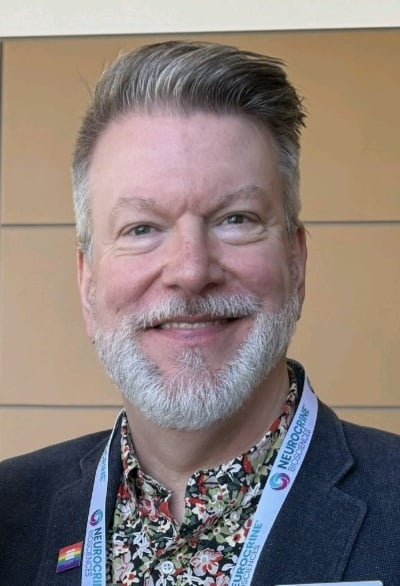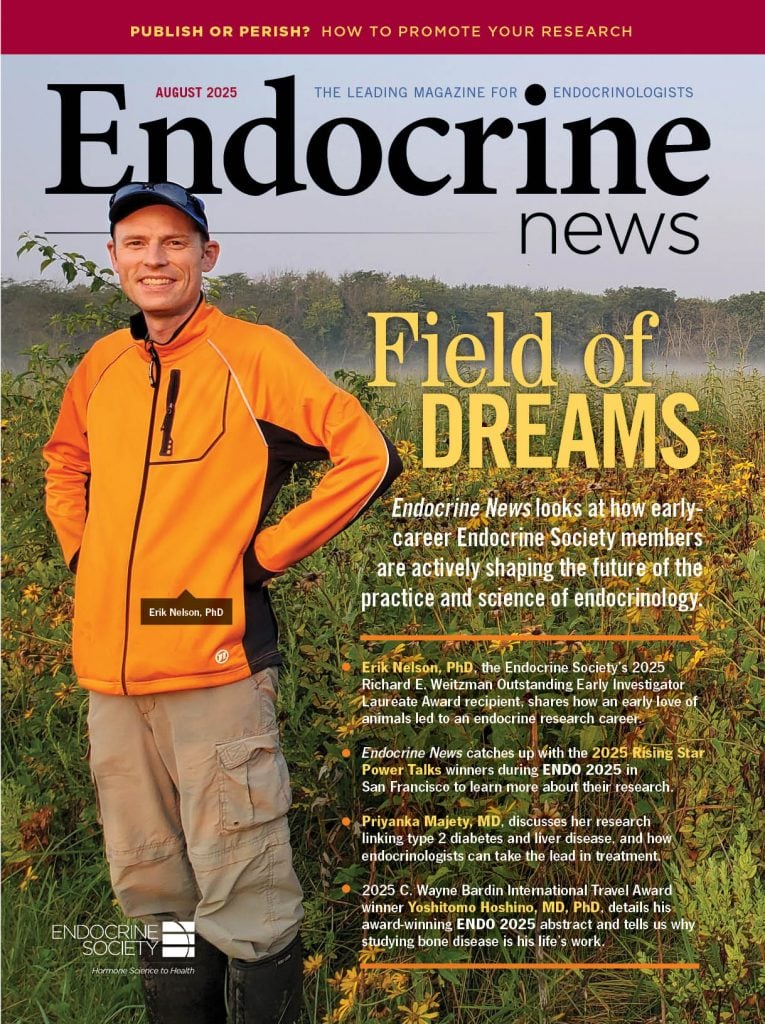
I’ll admit it: After ENDO each year I get into what I call the “post-ENDO funk” because, well, I enjoyed ENDO so much. It’s kind of like the post-holiday lows many people feel after Christmas, Thanksgiving, and New Year’s, but more ENDO focused! And ENDO 2025 in San Francisco last month was certainly no exception. And, as it turns out, I spent a fair amount of time at early-career related events in anticipation of this issue that highlights and lauds our early-career Endocrine Society members!
Who better to feature on this month’s cover than the Endocrine Society’s 2025 Richard E. Weitzman Outstanding Early Investigator Laureate Award recipient, Erik Nelson, PhD? In “Animal Magnetism,” Nelson talks to writer Glenda Fauntleroy Shaw about how his interest in animals and animal biology eventually led to a desire to see how chemistry and molecules work in animals, which in turn inspired him to a career in endocrinology and endocrine science. Now, Nelson and his lab are pursuing studies that focus on how cholesterol homeostasis can impact the immune system, specifically within tumors. From his research, one thing that kept popping up was cholesterol. “It turns out that if you have elevated cholesterol levels, then you are more likely to develop metastatic recurrence sooner than if you had lower cholesterol,” Nelson says. “And I think even more strikingly, survivors who are taking statins or cholesterol-lowering medication tend to have a better prognosis.”

One of the most well attended events at ENDO each year is the Rising Star Power Talks where endocrine scientists from around the world present their research in a fast-paced “lightning round” that is rated by a panel of judges as well as the attendees in the room! This year’s event was no exception, and I grabbed the winners before they scattered throughout the Moscone Center on Sunday July 13 after their presentations to find out more about their winning science, the future research goals, and even the impact that the Endocrine Society has had on their careers in “Star Power 2025.” Translational Science winner Rossella Cannarella, MD, PhD, from the University of Catania, in Catania, Italy, says that the Society has played a pivotal role in shaping both her academic and research careers. “Its conferences, publications, and professional network have provided both inspiration and critical feedback that have helped me refine my research questions and methodologies,” she says. “Being part of a global community committed to advancing endocrine science is deeply motivating. The Society’s support for early-career researchers and its emphasis on translational research have been especially valuable.”
Senior Editor Derek Bagley speaks with Priyanka Majety, MD, about her recent research that details the relationship between type 2 diabetes and liver disease, both of which continue to markedly increase, in “Vicious Cycle.” She says that endocrinologists are uniquely positions to address this crisis since insulin resistance is a central issue because it promotes fat accumulation, oxidative stress and inflammation, which worsen insulin resistance, thus creating a “vicious cycle,” adding that “[Metabolic Dysfunction-associated Steatotic Liver Disease] (MASLD) worsens glycemic control by contributing to systemic insulin resistance and altering glucose metabolism. This interplay not only accelerates liver disease progression but also increases the risk of cardiovascular and kidney complications.”
In “Pacific Overtures,” Glenda conducts a Q&A with the Endocrine Society’s 2025 C. Wayne Bardin International Travel Award Winner Yoshimoto Hoshino, MD, PhD. A physician-scientist and an in-training Endocrine Society member from Tokyo, Japan, Hoshino was grateful for the opportunity to present his research at ENDO 2025 last month. He tells us more about his award-winning abstract, how studying bone disease became his life’s work, and his future research goals. Glenda’s work is also featured in this month’s Laboratory Notes column that details “Putting Your Research Paper in the Spotlight,” an important achievement for scientists and researchers at all stages of their careers, but especially vital for endocrinologists still in the dawn of their lifetime of achievements. In other words, getting your paper in a prestigious peer-reviewed journal is just the first step in presenting your work to a broader audience.
Enjoy this look at the Endocrine Society’s early-career members and their accomplishments. I have no doubt we’ll see much more of them in future issues of Endocrine News!

